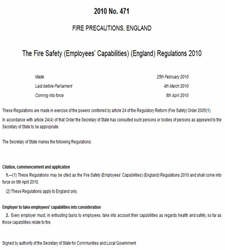Fire Safety (Employees Capabilities) (England) Regulations 2010
An additional piece of legislation of the Regulatory Reform (Fire Safety) Order 2005 was released on the 6th of April 2010. It is purely a technical wording that states the employer has to think about what a worker is able and unable to do when giving them tasks that relate to fire safety. The new regulation states, 'Employer to take employees capabilities into consideration, every employer must, in entrusting tasks to employees, take into account their
capabilities as regards to health and safety, so far as those capabilities relate to fire.' It reinforces what the Regulatory Reform (Fire Safety) Order 2005 indicates and it simply supports the duty that staff must have 'sufficient training and experience or knowledge' (RRO). So, employers will now have to think about; what a worker is able and unable to do when giving those tasks and how these capabilities may affect their ability to deal with fire related risks.
For example; a fire warden, before being entrusted with his duties must have sufficient information and training on their evacuation procedure, the areas they are required to sweep and the precautions they must take when carrying out these tasks. It should not state in their responsibilities that they are required to try and extinguish a fire if they have not had the training to use a fire extinguisher. With little or no knowledge, there could be a huge accident if the fire warden was to use a water extinguisher on an electrical fire. It would not be a successful extinguish.
This regulation is suggested that it should not impose any substantive additional burdens on an organisation, although on enforcement, the fire and rescue authorities will be attentive on the capabilities of the staff that have designated responsibilities within fire safety.
To avoid the consequences on enforcement, it is recommended that staff be trained in their duties, providing them with enough knowledge and experience to ensure the safety of others and themselves.
For further information on the regulations please visit our Legislations page or click here to be directed.
 Solutions on Fire Newsletter
Solutions on Fire Newsletter